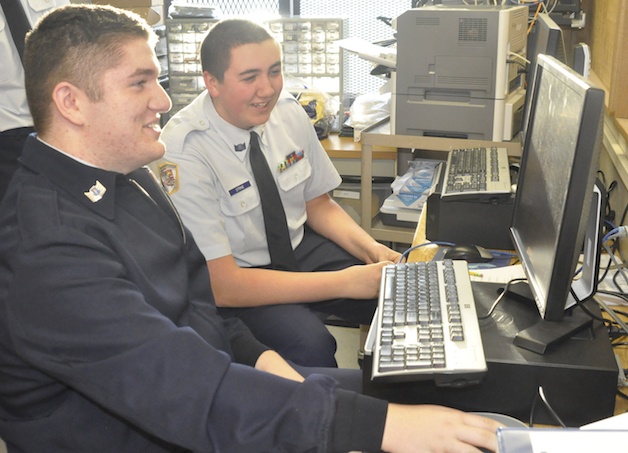ARLINGTON — “We’re not hackers,” said Richard Pugh, a cadet in Arlington High School’s Air Force Junior ROTC. “We’re the exact opposite.”
The cadets are getting a hands-on education in safeguarding computers through the national CyberPatriot competition.
Teams are only allowed five members, plus one alternate, each round consists of timed tests, lasting six hours, of checking for viruses and other errors on a variety of computer operating systems. The Air Force server grades the students’ performance in virtual real time, telling them how many problems they have left to fix, but leaving it to the students to figure out what types of viruses they might be.
“They’re working on systems from Windows XP and Vista on up,” said John Pugh, Richard’s father, a Microsoft employee who serves as an advisor to the program. “Because it’s not telling them what vulnerabilities they’ve missed correcting, they really have to know what they’re looking for.”
Maj. Mike Blue, senior aerospace science instructor, added: “Their families bring in snacks to keep them fueled up, though.”
The Arlington cadets have found that they work more efficiently by subdividing into even smaller numbers. By pairing off, they can work two problems at a time, and avoid having “too many cooks in the kitchen,” which Blue admitted was an issue when all five were working in the same room.
As for what drew the Arlington cadets to the CyberPatriot program, they see a combination of career prospects and larger societal benefits to the lessons they’re learning.
Pugh and fellow cadet Thomas Strine cited the possibility of high-end Information Technology jobs with firms such as Cisco. Blue confirmed that students who earned their certifications through CyberPatriot have been hired at starting salaries of $70,000 and up, “which was more than those companies’ existing IT people, because those kids knew things from their training that the folks who were already working there didn’t.”
Perhaps more importantly, Pugh agreed with fellow cadets Cody Barschaw and J.D. Finch that the CyberPatriot program fosters a sense of self-sufficiency and collaboration.
“It gives you the skills to take care of your computer’s security and do things for yourself, without needing to pay other people,” Finch said.
Barschaw added: “It develops your critical thinking and problem-solving abilities, but it also teaches you how to trouble-shoot issues as part of a team.”
Strine sees himself using his newfound cyber-security skills at whatever workplace he winds up at, to help tighten their existing safeguards, as well as to help his parents with their software issues.
“That’s something every mom and dad wants,” he laughed.
The AHS team has made it through the first two rounds, placing them in the middle 40 percent of more than 3,300 teams. To advance, they’ll need to make it through the Jan. 29-31 competition.
CyberPatriot is in its eighth year, so Blue is pleased with how well his cadets have performed in their first year of competition, especially given that the competition is open to any school, from middle through high schools, private schools and even overseas Department of Defense schools.
Barschaw agrees with fellow cadet Zechariah Rodino that a greater awareness of cyber-security is essential to everyday life, with Barschaw noting that he’ll never do his online banking on a public network.
“Technology keeps leveling up, so we have to adapt,” Barschaw said.







